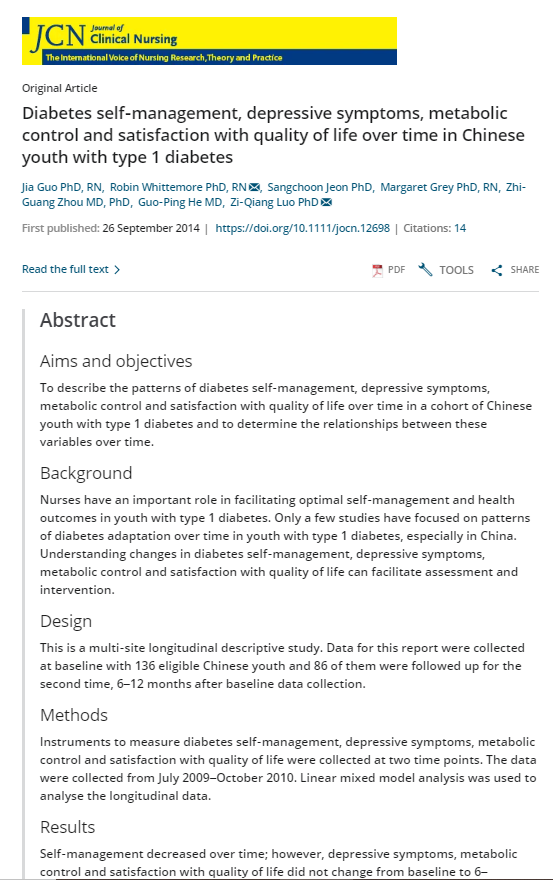Impact Factor:1.972
DOI number:10.1111/jocn.12698
Affiliation of Author(s):中南大学
Journal:Journal of Clinical Nursing
Place of Publication:英国
Key Words:depressive symptoms; diabetes self-management; longitudinal survey; metabolic control; nursing; quality of life; type 1 diabetes; youth.
Abstract:Aims and objectives: To describe the patterns of diabetes self-management, depressive symptoms, metabolic control and satisfaction with quality of life over time in a cohort of Chinese youth with type 1 diabetes and to determine the relationships between these variables over time. Background: Nurses have an important role in facilitating optimal self-management and health outcomes in youth with type 1 diabetes. Only a few studies have focused on patterns of diabetes adaptation over time in youth with type 1 diabetes, especially in China. Understanding changes in diabetes self-management, depressive symptoms, metabolic control and satisfaction with quality of life can facilitate assessment and intervention. Design: This is a multi-site longitudinal descriptive study. Data for this report were collected at baseline with 136 eligible Chinese youth and 86 of them were followed up for the second time, 6-12 months after baseline data collection. Methods: Instruments to measure diabetes self-management, depressive symptoms, metabolic control and satisfaction with quality of life were collected at two time points. The data were collected from July 2009-October 2010. Linear mixed model analysis was used to analyse the longitudinal data. Results: Self-management decreased over time; however, depressive symptoms, metabolic control and satisfaction with quality of life did not change from baseline to 6-12 months in this sample of Chinese youth with type 1 diabetes. A decrease in diabetes self-management over time was associated with worse metabolic control, while an increase in depressive symptoms over time was associated with poorer quality of life satisfaction in this sample. Conclusions: Chinese youth faced difficulties with diabetes adaptation, especially with the deterioration of diabetes self-management. Improving self-management and decreasing depressive symptoms may enhance diabetes adaptation with respect to metabolic control and quality of life. Relevance to clinical practice: The deterioration of diabetes self-management over time in youth with type 1 diabetes in China deserves nurses' careful surveillance. Clinical interventions appropriate to the Chinese culture and health care system are needed to improve self-management and depressive symptoms in Chinese youth with type 1 diabetes.
Note:Q1区
Co-author:Sangchoon Jeon, Margaret Grey, Zhiguang Zhou, Guoping He, Ziqiang Luo
First Author:Jia Guo
Indexed by:Journal paper
Correspondence Author:Robin Whittemore
Discipline:护理学
Document Type:J
Volume:24
Issue:9-10
Page Number:1258-1268
Translation or Not:no
Included Journals:SCI


